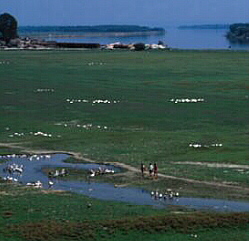 |
| A glimpse of the Danube Delta |
In the past decade, this international focus has led to a growing number
of cooperation activities with countries and institutes in the Danube Basin.
These activities have been stimulated by the proposed accession of countries
in the Danube Basin to the EU.
RIZA has established long-term partnerships with key institutes responsible
for the Danube Delta and floodplains, i.e. areas that are morphologically
and ecologically similar to the Netherlands and can provide valuable references
for ecological restoration in the Netherlands. The institutes include the
Romanian Danube Delta National Institute and Apele Romana. Cooperation with
the Danube Delta National Institute started in 1991 and has produced a survey
of the aquatic ecology, and maps of the vegetation and bird population of
the Danube Delta. Cooperation with Apele Romana has led to the creation
of a restoration plan for the floodplains along the Prut River. Both projects
have involved frequent expert missions - field missions in Romania and reporting
missions in the Netherlands.
RIZA’s interest in transboundary rivers and groundwater bodies has
led it to actively participate in an intensive pilot project to test the
UN ECE Monitoring Guidelines in a number of transboundary rivers in the
Danube Basin such as the Mures (Romania-Hungary), the Ipoly (Slovakia-Hungary)
and the Morava (Slovakia-Czech Republic) rivers, and in transboundary groundwater
bodies such as the Aggletek aquifer (Slovakia-Hungary). In the pilot project,
national experts make inventories of point and diffuse pollution sources,
evaluate legislation and specify information needs. RIZA contributes by
organising expert visits and workshops and hosting the International Water
Assessment Centre (IWAC).
RIZA is a recognized player in the national network made up of the various
bodies of the Dutch government, the general public and commercial consultants.
Finding a place for international partners in this network can lead to interesting
partnerships. In Slovakia, local water boards have been coupled with Dutch
regional water boards in one-on-one twinning arrangements. In the Danube
Delta, a partnership is growing between the Ukrainian community of Vilkovo
and a Dutch municipality, both of which have transformed their surroundings
into a maze of canals and bridges and are situated at the border of wetland
reserves. Vilkovo has high hopes from eco-tourism and can benefit from the
experience of their Dutch counterparts. RIZA’s future activities in
the Danube Basin will increasingly move in the direction of establishing
this type of networks.
The cooperation activities are generally placed under the umbrella of Memoranda
of Understanding at the level of national ministries. At present, the Dutch
Ministry of Transport, Public Works and Water Management, under which RIZA
operates, has active MOUs with Slovakia, Hungary, Croatia, Romania and Ukraine.
MOUs primary focus lies in an exchange of knowledge in the fields of flood
control, laboratory procedures, pollution control, water quality assessment,
ecological assessment and ecological restoration, and in non-technical subjects
such as open planning processes, economic mechanisms, and institutional
and organisational aspects.